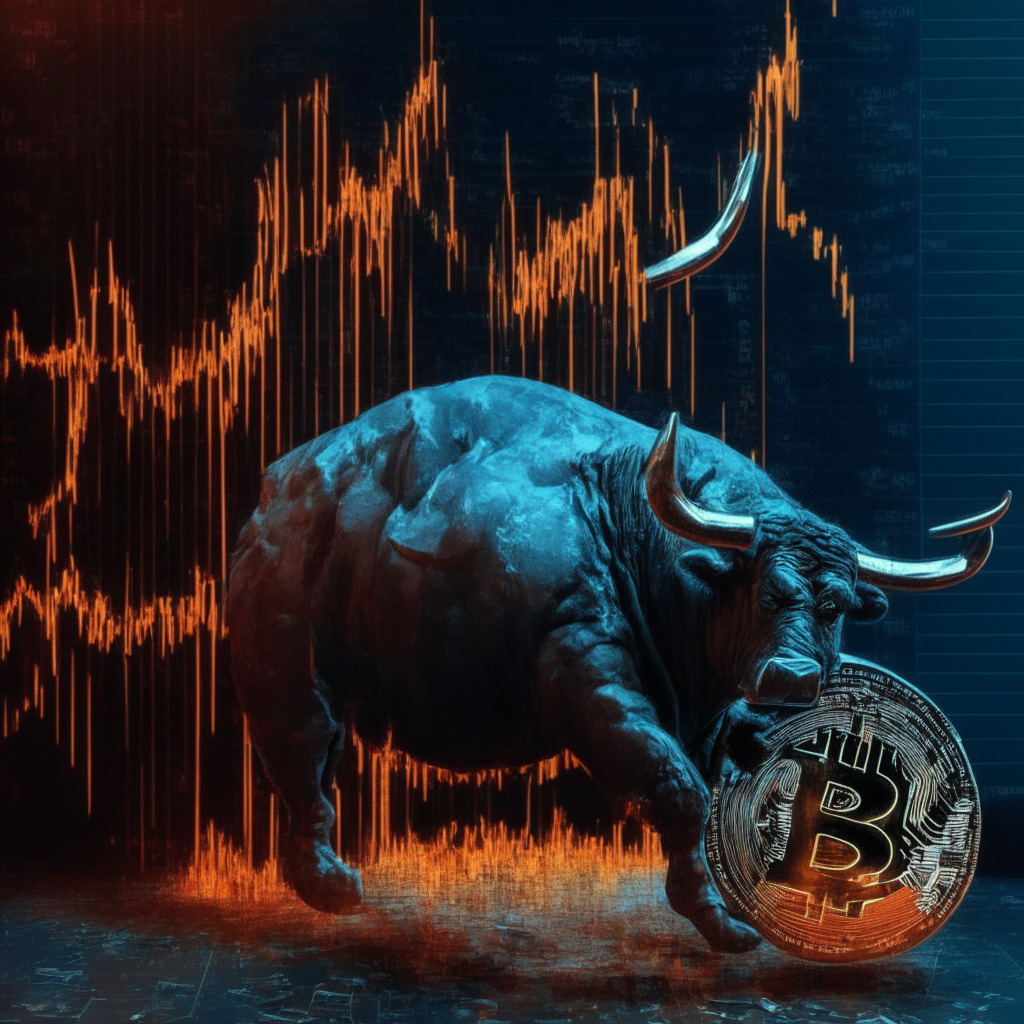The U.S. Government’s debt downgrade by Fitch Ratings may impact the digital investment market, including Bitcoin. Investors are being driven from traditional assets into safer short-term instruments. Amidst this uncertainty, the potential lies for investors to shift towards decentralized avenues like cryptocurrencies.
Search Results for: China Post
Regulatory Hurdles and Cryptographic Breakthroughs: A Dive Into the World of Digital Currency
The global payment powerhouse, PayPal, has introduced its Ethereum-based stablecoin, PYUSD, stirring up the digital currency landscape. Simultaneously, cryptographic activities like Sam Altman’s Worldcoin faces regulatory challenges in Kenya. Meanwhile, Curve Finance showcases resilience by recovering 73% of funds stolen in a recent hack. Despite occasional regulatory complexities, these developments affirm the dynamic growth in the cryptographic domain.
Navigating Turbulence: Predictions, Whales and Fear in Bitcoin’s Bullish Future
Bitcoin’s value could skyrocket pre-2024 halving event, according to Blockstream CEO Adam Back, with “whales” confidently accumulating Bitcoins despite market volatility. Bitcoin’s current value sits at $29,080, with key factors, such as the Bitcoin ETF approval and report releases like July’s Consumer Price Index, potentially stirring market dynamics. Cryptocurrencies remain high-risk investments, emphasizing the need for personal research.
Navigating the New Terrain: Implications of the NDAA Bill on Crypto Privacy and Regulation
The U.S. Senate has passed the National Defense Authorization Act, imposing new regulations on the digital asset world, including privacy coins and crypto mixers. The regulations aim to stem crypto-related fraud and are expected to force an elevation in crypto regulatory standards, obliging authorities to crack down on anonymous crypto transactions. The discourse reflects the conflict between privacy freedoms versus governance needs in the crypto sector.
Bitcoin Surfs Above $29,000 Amid U.S. Monetary Shift: Musk’s DOGE, Market Outlooks, and Inflation Fears
Despite the U.S. Federal Reserve’s impending hawkish shift, BTC maintains support above $29,000, while most other cryptos face a gloomy market. DOGE uniquely rose 8%, potentially due to rumors of wider crypto usage in Elon Musk’s new Twitter platform, X.
The Future of Blockchain: Balancing Innovation with Stability and Security
“China’s mobile payment giants, WeChat Pay and Alipay, have abolished the requirement of a local bank account for foreign visitors, enabling international credit cards. Meanwhile, royalty volumes for NFTs on the Ethereum Blockchain have significantly dipped, causing concerns about their sustainability. Banks in Korea are exploring CD tokens as a stable alternative. Crypto wallet, Zengo introduced a premium subscription, and discussions on security vulnerabilities in crypto are ongoing.”
15 Central Bank Digital Currencies by End of Decade: A New Era of Finance or Privacy Threat?
By the end of this decade, around 15 retail central bank digital currencies (CBDCs) could be globally available, covering nearly 95% of the world economy according to BIS. This emerging technology can offer significant benefits, but also brings challenges like privacy concerns.
UAE Emerges as New Powerhouse in Bitcoin Mining: Opportunities and Challenges
“Bitcoin mining companies are gravitating towards the UAE, now becoming a Middle Eastern hub for crypto mining. Its digital adoption, affordable energy, and crypto-friendly stance have attracted these companies. Currently, it’s home to nearly 4% of the Bitcoin global hashrate.”
Hong Kong’s Web3 Regulation: Balancing Innovation and Investor Protection
Hong Kong embraces Web3 regulation by incorporating virtual asset providers into the regulatory system, fostering innovation and strengthening market trust. New rules enforce Anti-Money Laundering guidelines and investor protection laws while permitting retail investors to trade virtual assets.
Chinese Crypto Side Jobs: Legal Risks vs Lucrative Rewards in a Strict Regulatory Environment
A growing number of Chinese citizens are participating in “side jobs” that facilitate crypto transactions, despite government crackdowns. However, China’s Ministry of Public Security warns such activities may constitute assisting IT network fraud, with potential jail sentences and fines for those convicted. Authorities claim money laundering and fraud account for the majority of crypto-related crimes.
Merging Giants: Hut 8 Mining & US Bitcoin Corp to Form $990M North American Crypto Powerhouse
Bitcoin miners Hut 8 Mining and U.S. Bitcoin Corp plan to merge, creating a $990 million North American crypto mining giant, Hut 8 Corp. The merger aims to expand revenue, adopt a diversified business model, and capitalize on their financial position.
Revelations on Tether’s Reserves: Chinese Securities, Stability & Regulatory Scrutiny
Tether Holdings Ltd. is under scrutiny as findings reveal it may have held securities issued by Chinese firms in its reserves backing USDT stablecoin. Regulators question the underlying assets providing USDT’s stability, raising concerns about potential regulatory risks and the stablecoin’s overall reliability.
Prometheum: Bridging Traditional Finance to Crypto or SEC’s Chosen Prodigy? Debating Compliance and Controversy
Crypto startup Prometheum gains attention as the first crypto-centric broker-dealer registered with the SEC and a member of FINRA. Despite controversy, the firm’s regulatory status may provide insights into the SEC’s perspective on digital asset compliance, impacting future crypto startups seeking regulation.
Digital Yuan Takes Center Stage at Summer World University Games: Pros, Cons & Impact
Student athletes will use China’s digital yuan at the Summer World University Games in Chengdu, marking the first major international sports event to officially adopt the digital currency. The event aims to generate interest in digital yuan, promoting its adoption and showcasing the potential of CBDCs in future global events.
SEC’s Pursuit of Binance & CZ: Impact on Crypto Exchange Transparency and Regulation Battle
The SEC seeks alternative means to serve legal papers to Binance and CEO Changpeng Zhao due to their elusive locations. Amid a 136-page lawsuit containing accusations of securities violations and market manipulation, the situation raises concerns about large cryptocurrency exchanges’ transparency and highlights the need for a regulatory framework.
Bitcoin’s Struggle at $27,000: Regulatory Scrutiny and Global Economic Crisis Impact
Bitcoin price nears $27,000 but faces challenges from stricter regulatory scrutiny following FTX’s bankruptcy and a global economic crisis. Bitcoin derivatives markets indicate low probability of breaking above $27,500, suggesting a bearish market structure and a likely $25,500 support retest.
Apple Acquires AR Startup Mira: Exploring Mixed Reality Market and Metaverse Opportunities
Apple acquires Mira, an AR startup providing smartphone-powered headsets for industrial applications, strengthening its foothold in the mixed reality market. The acquisition raises questions about compatibility and future direction, as Apple’s Vision Pro focuses on personalized virtual reality.
Uniswap Scam Exposes Sophisticated Deception: How to Stay Safe in Crypto
The crypto community experienced a sophisticated scam involving a fraudulent Uniswap website, complete with a fake Zoom recording featuring imposters posing as Uniswap executives. The incident highlights the importance of vigilance and thorough research in the ever-changing world of blockchain and cryptocurrency.
Bloomberg Analyst’s Bearish Outlook on Bitcoin: Causes and Potential Market Impact
Bloomberg analyst Mike McGlone recently released his June Crypto Outlook report, forecasting potential downfall for Bitcoin and the entire crypto market. He points to factors such as a possible US recession, bear market for equities, and high interest rate competition as potential triggers for decline.
2023 Crypto Cycle: Chinese Narrative, Altcoin Surges, and the Quest for Sustainable Investments
The 2023 crypto cycle has seen captivating narratives like the bullish ‘Chinese narrative’, which has […]
Multichain Drama: Arrest Rumors, Locked Servers, and Suspended Services Unravel Crypto Startup
Crypto startup Multichain faces challenges after rumors of team members’ arrests and loss of communication with their CEO, Zhaojun. With affected cross-chain services, uncertainty surrounds users’ fund accessibility and private key control. Connection to recent arrests in China remains unconfirmed.
Multichain Crisis Deepens: $1.6B Wallet at Risk, Fantom’s Impact, and Regulatory Lessons
The blockchain bridge MultiChain crisis deepens amidst rumors of team members’ arrests and control over a wallet containing $1.6 billion. Binance suspends withdrawals for several tokens, and concerns grow over potential impact on the broader crypto ecosystem, particularly the Fantom network.
Chinese State-owned Firm Enters Hong Kong’s Digital Asset Hub: Pros, Cons, and Main Conflicts
Chinese state-owned real estate company Greenland Holdings plans to join Hong Kong’s digital asset hub by creating a new unit to acquire virtual asset trading licenses. This move supports Hong Kong’s efforts to become a prominent digital assets trading center and diversifies Greenland Holdings’ business in the growing market.
First State-Owned Chinese Company Applies for Hong Kong Crypto License: Pros, Cons, and Impact
Greenland Financial Technology Group, a subsidiary of Greenland Holdings, becomes the first state-owned Chinese company to apply for a virtual asset trading license in Hong Kong, with plans to establish a dedicated company for virtual asset trading, including cryptocurrencies, NFTs, and carbon emission-related products. This move signifies the significant potential of Hong Kong’s virtual asset market and its potential as a global crypto hub.
BNP Paribas Connects Digital Yuan Wallets: Integration Breakthrough or Power Shift Concern?
BNP Paribas connects digital yuan wallets to bank accounts, enabling corporate clients to access e-CNY via the Bank of China’s system. This could facilitate seamless transactions but raises concerns over China’s financial power and privacy issues.
Crypto Mining Energy Tax Debate: Environmental Impact vs Decentralization Benefits
The White House proposes a 30% Digital Asset Mining Energy (DAME) excise tax on crypto miners, targeting the industry’s environmental impact, energy prices, and greenhouse gas emissions. Critics argue the benefits of cryptocurrencies outweigh the environmental costs, emphasizing greener energy transitions and the potential to reduce central bank manipulation. Debate surrounding crypto regulation continues as technology and the industry evolve.
Litecoin Halving 2023: Bullish Rally or Downward Plunge – Analyzing LTC’s Future Prospects
Litecoin (LTC) enthusiasts anticipate the upcoming halving event in August 2023, with creator Charlie Lee predicting a 700% increase in LTC/BTC. Factors like higher throughput, scalability, and increased privacy from MWEB contribute to Litecoin’s potential growth, but its price trajectory post-halving remains uncertain.
US National Security Policy: Economic Disruptions and the Search for Balance
US national security policy faces criticism from international analysts for causing global economic disruptions and negatively impacting supply chains. Experts argue that these policies prioritize national security over essential issues and politicize trade, ultimately stifling other nations’ developmental rights. Constructive economic relationships are crucial for a balanced approach to national security.



























